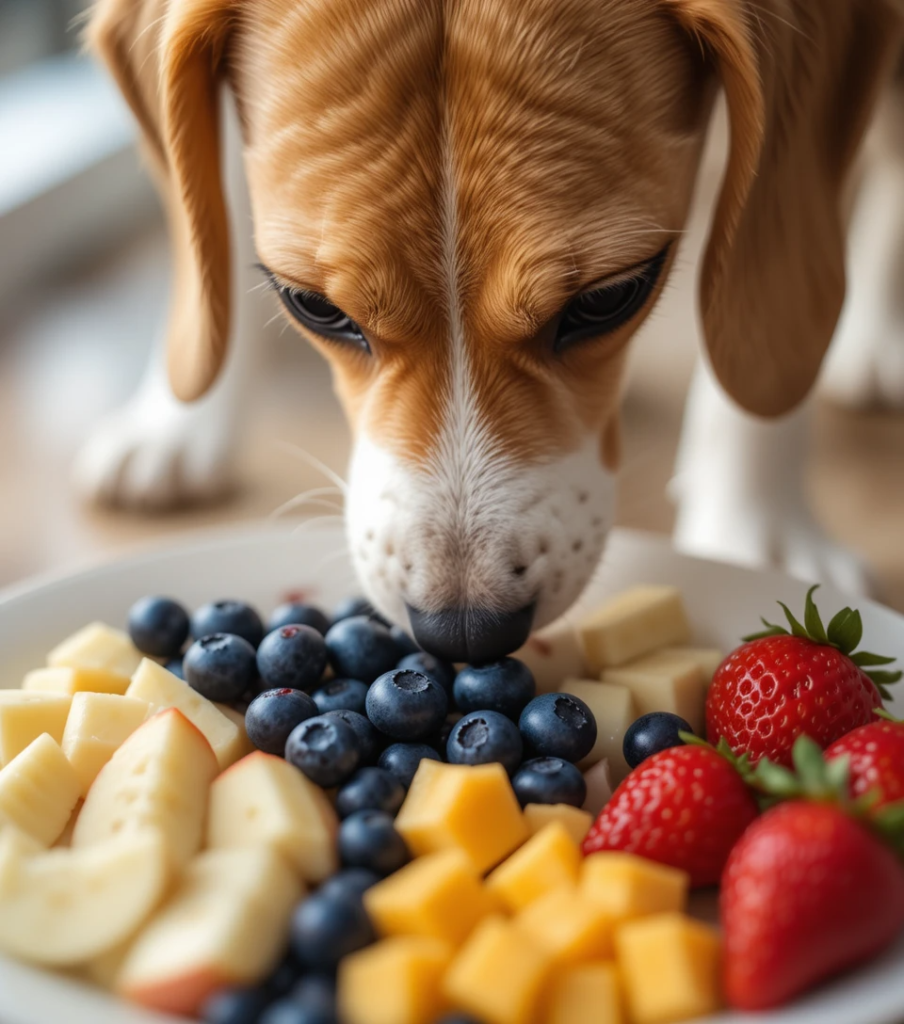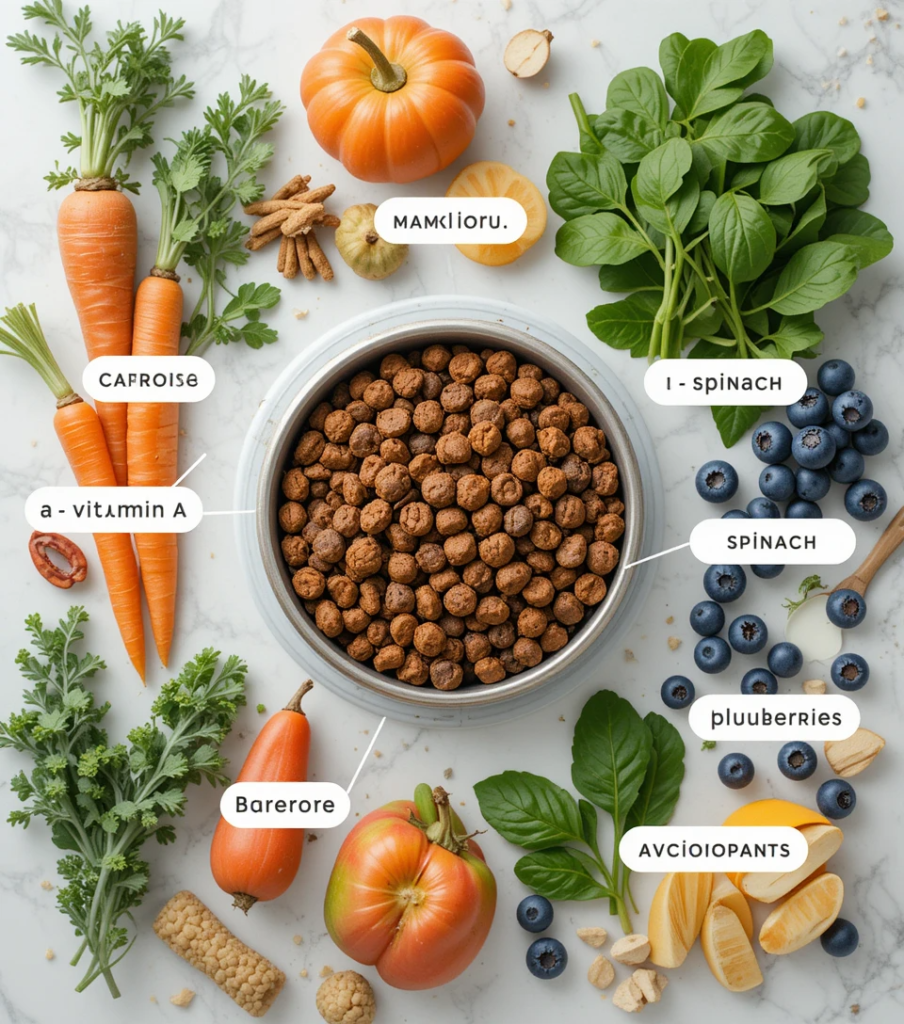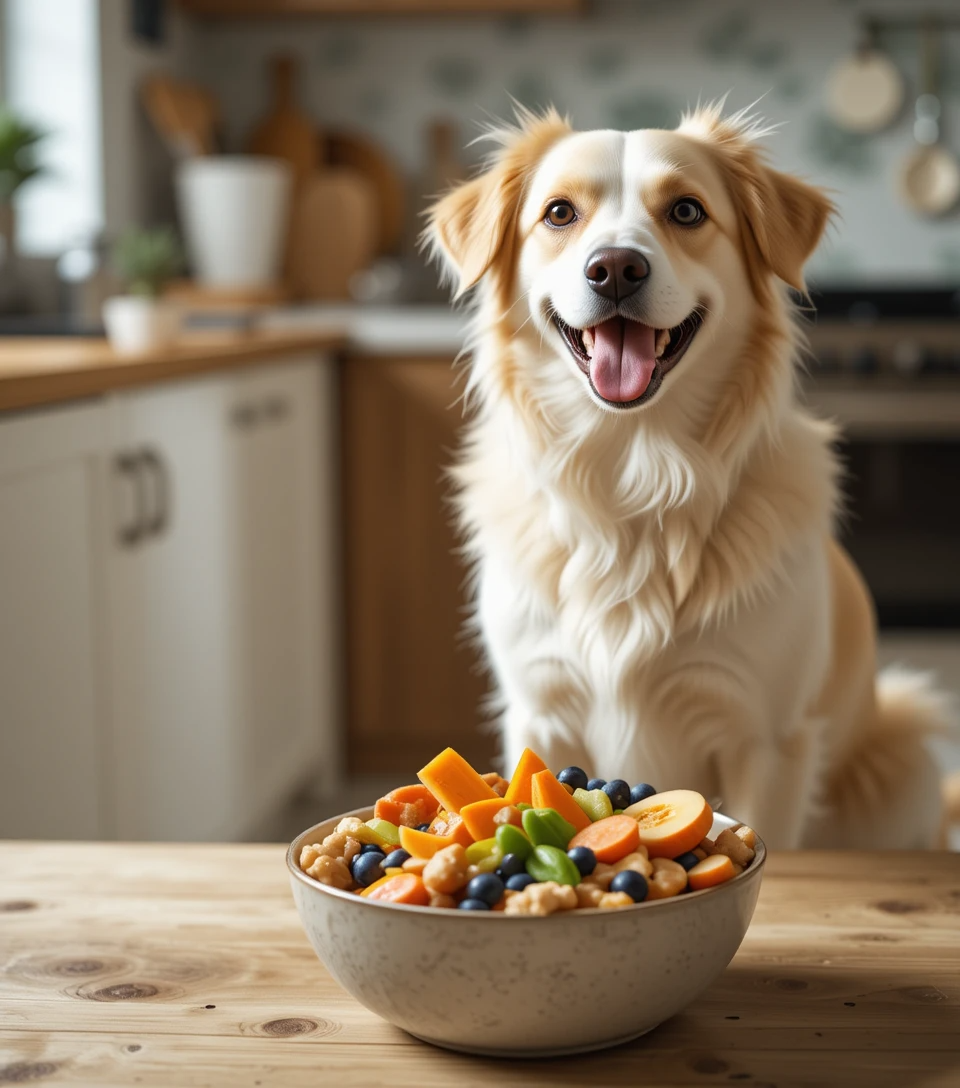Fruits and vegetables aren’t just for humans—they can be a powerful, natural boost to your dog’s health too. Whether you’re feeding kibble, fresh meals, or homemade dog food, incorporating the right plant-based ingredients can help improve your dog’s digestion, immune function, skin, and even mood. Let’s explore why this health upgrade is more than just a trend—and how it can change your dog’s life.
🥦 Why Add Fruits and Vegetables to Dog Food?
Dogs are omnivores, meaning they can digest both animal and plant-based foods. While meat provides essential protein, fruits and vegetables offer valuable vitamins, minerals, antioxidants, and fiber—all crucial for a balanced diet.
Key Benefits:
- Boosts immune system with antioxidants and vitamin C
- Aids digestion thanks to natural fiber
- Improves skin and coat health with vitamin E and omega-supporting compounds
- Reduces inflammation via phytonutrients
- Helps with weight control through low-calorie, nutrient-dense options
🍎 Top Dog-Friendly Fruits

Adding fresh, dog-safe fruits to meals or as treats is an easy way to enhance nutrition.
Recommended Fruits:
- Blueberries – High in antioxidants; support brain health
- Apples (no seeds) – Great source of fiber and vitamin A
- Bananas – Provide potassium and natural energy
- Watermelon (seedless) – Hydrating and low in calories
- Strawberries – Rich in vitamin C and fiber
Pro tip: Serve in small, bite-sized pieces to prevent choking.
🥕 Best Vegetables for Canine Nutrition
Many vegetables are packed with essential nutrients dogs need—but not all are safe. Stick with those that are non-toxic and easily digestible.
Recommended Vegetables:
- Carrots – Loaded with beta-carotene for eye health
- Spinach – High in iron and folate (in small quantities)
- Pumpkin – Excellent for digestion and firm stools
- Green beans – Low-calorie and fiber-rich
- Sweet potatoes – Support gut health and immune strength
Cook or steam veggies for easier digestion and better nutrient absorption.
🧪 Essential Vitamins & Minerals They Provide

Fruits and vegetables offer:
- Vitamin A – For vision and immune defense
- Vitamin C & E – Antioxidants that fight aging and disease
- Vitamin K – Supports blood clotting and bone health
- Potassium & magnesium – Aid heart and muscle function
- Iron & calcium – Strengthen bones and oxygen transport
Including a range of fruits and veggies ensures your dog gets complete micronutrient support without artificial supplements.
🚫 What to Avoid
Not all produce is safe for dogs. Some can be toxic—even in small amounts.
Dangerous to Dogs:
- Grapes and raisins – Can cause kidney failure
- Avocado – Contains persin, harmful in large doses
- Onions and garlic – Damage red blood cells
- Cherries and peaches (with pits) – Choking hazards and toxic seeds
- Raw potatoes – Contain solanine, which is toxic to dogs
Always check with your vet before introducing a new food.
🐾 How to Add Fruits and Veggies to Your Dog’s Diet
- Start small – Introduce new ingredients gradually
- Balance is key – Don’t exceed 10–15% of total daily food
- Cook when needed – Steam or bake for digestibility
- Avoid added salt or seasoning
- Mix into meals or use as treats
Homemade dog meals or high-quality fresh dog food brands often incorporate fruits and vegetables—just check the label for whole-food ingredients.
✅ Final Thoughts
Adding fruits and vegetables to your dog’s diet is a simple yet powerful upgrade. Packed with essential nutrients and natural health boosters, they support everything from digestion to immunity—without the need for synthetic vitamins. Just be mindful of what’s safe, and consult your vet when in doubt. Your dog will thank you—with wagging tails and vibrant health!
❓ 10 FAQs About Fruits and Vegetables in Dog Food
- Can dogs eat fruits and vegetables every day?
Yes, in moderation. Daily inclusion of safe fruits and veggies can provide excellent nutritional support. - Are raw vegetables safe for dogs?
Some are, like carrots. Others are better cooked for easier digestion, such as sweet potatoes and spinach. - Which fruits are toxic to dogs?
Grapes, raisins, and cherries (with pits) are toxic and should be avoided completely. - What’s the best vegetable for dog digestion?
Pumpkin is one of the best for digestive support and firming up stools. - Can puppies eat fruits and vegetables?
Yes, but start with small amounts and consult your vet to ensure safety based on their age and breed. - How do I know how much to feed?
Fruits and vegetables should make up no more than 10–15% of your dog’s total diet unless directed otherwise by a vet. - Are canned fruits okay for dogs?
Generally no—many contain added sugars or preservatives. Stick with fresh or frozen, unsweetened options. - Do commercial dog foods contain real fruits and veggies?
Some high-quality brands do. Check for whole-food ingredients on the label, not powders or synthetic versions. - Can fruits and veggies replace meat in a dog’s diet?
No, dogs still need animal-based protein. These should be additions, not replacements. - Is it better to mix them in meals or offer as treats?
Either works! Mixing into meals ensures balance; using them as treats helps with portion control.

